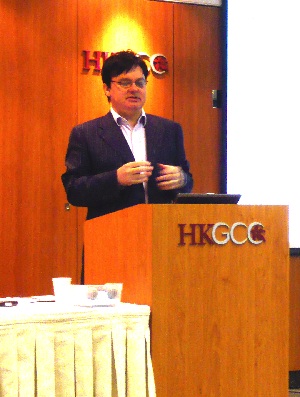Speaker: Roger Durn CEO Zip2Zap Communications Ltd
Why Mashups and their concepts are rapidly moving into the business primetime.
 Figure 4: Zip2Zap CEO Roger Durn
Figure 4: Zip2Zap CEO Roger Durn
Today’s economy dictates efficiency and the need to ‘do more with less’. Although mashups started out in the consumer space, their success and speed of development and deployment has made the migration into corporate
IT environments inevitable.
These new style web or application services are being developed and deployed at an amazing rate by many organisations and they can no longer be thought of as merely for the ordinary consumer; enterprises have begun to see the value of this kind of offering.
In this session, Roger discussed and demonstrated examples of how to provide services to mashups, and how to consume and transform the services into new
applications. As the CEO of a company that creates this kind of solution for many enterprises, Roger showed how relevant it is to today’s businesses.